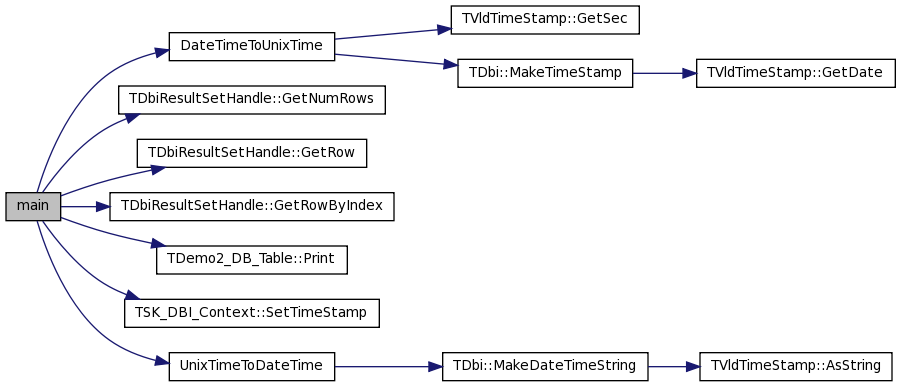demo_with_rollback.cxx File Reference
#include "TVldTimeStamp.hxx"#include "TDbi.hxx"#include "TSK_DBI_Context.hxx"#include "TDemo2_DB_Table.hxx"#include "TResultSetHandle.hxx"#include <iostream>#include <string>
Include dependency graph for demo_with_rollback.cxx:

Go to the source code of this file.
Functions | |
| Int_t | DateTimeToUnixTime (const std::string &dateTime) |
| std::string | UnixTimeToDateTime (Int_t unixSecs) |
| int | main () |
Function Documentation
| Int_t DateTimeToUnixTime | ( | const std::string & | dateTime | ) |
Definition at line 29 of file demo_with_rollback.cxx.
References TVldTimeStamp::GetSec(), and TDbi::MakeTimeStamp().
00029 { 00030 return TDbi::MakeTimeStamp(dateTime).GetSec(); 00031 }
Here is the call graph for this function:

| int main | ( | ) |
Definition at line 46 of file demo_with_rollback.cxx.
References DateTimeToUnixTime(), TDbiResultSetHandle< T >::GetNumRows(), TDbiResultSetHandle< T >::GetRow(), TDbiResultSetHandle< T >::GetRowByIndex(), TDemo2_DB_Table::Print(), TSK_DBI_Context::SetTimeStamp(), SK_DBI_Log, and UnixTimeToDateTime().
00046 { 00047 00048 00049 // Examine the Database table DEMO_DB_TABLE every 5 days between the start 00050 // and end date. 00051 00052 std::string start_date_time = "2008-12-30 00:00:00"; 00053 std::string end_date_time = "2009-03-01 00:00:00"; 00054 00055 Int_t start_unix_time = DateTimeToUnixTime(start_date_time); 00056 Int_t end_unix_time = DateTimeToUnixTime(end_date_time); 00057 00058 UInt_t required_id = 1; 00059 00060 for (Int_t current_unix_time = start_unix_time; current_unix_time <= end_unix_time; current_unix_time += 5*24*60*60) { 00061 TSK_DBI_Context context; 00062 context.SetTimeStamp(current_unix_time); 00063 TResultSetHandle<TDemo2_DB_Table> rs(context); 00064 SK_DBI_Log("_______________________________________________________________________________"); 00065 Int_t numRows(rs.GetNumRows()); 00066 if ( ! numRows ) SK_DBI_Log("Applying query at " << UnixTimeToDateTime(current_unix_time) << " ... failed to find any results."); 00067 else { 00068 SK_DBI_Log("Applying query at " << UnixTimeToDateTime(current_unix_time) << " ... result set contains " 00069 << numRows << " rows as follows:-"); 00070 for (Int_t irow = 0; irow<numRows; ++irow) rs.GetRow(irow)->Print(); 00071 const TDemo2_DB_Table* required_row = rs.GetRowByIndex(required_id); 00072 if ( required_row ) { 00073 SK_DBI_Log(" required row " << 1); 00074 required_row->Print(); 00075 } 00076 else SK_DBI_Log(" cannot find required row " << 1); 00077 } 00078 } 00079 00080 return 0; 00081 }
Here is the call graph for this function:

| std::string UnixTimeToDateTime | ( | Int_t | unixSecs | ) |
Definition at line 33 of file demo_with_rollback.cxx.
References TDbi::MakeDateTimeString().
00033 { 00034 return TDbi::MakeDateTimeString(TVldTimeStamp(unixSecs,0)); 00035 }
Here is the call graph for this function:

 1.6.1
1.6.1